Iran’s Activists Unite In Call For Release of Imprisoned Poet

A unified statement from activists, writers, and artists has called for the release of imprisoned poet Habib Mousavi Bibalani and an end to repression.

A unified statement from activists, writers, and artists has called for the release of imprisoned poet Habib Mousavi Bibalani and an end to repression.
Mousavi, a notable opposition poet, was apprehended on Monday and has since been detained at Amirabad prison in Gorgan. The charges against him, such as "propaganda against the system" and "disturbing public opinion," have triggered widespread concern among his supporters and peers.
The statement, compiled by over 260 activists, states that rising repression and increased incarcerations signals fatal cracks in the regime. They slammed the incarceration of Mousavi and other activists and said such acts of repression are a sign of the regime losing hold of its oppressive power.
The statement said that writers have historically been primary targets during successive waves of repression and indicated that this is a sign of decreasing grip of authority. “When a political order violates every aspect of the lives of those who produce and distribute ideas and speech... it is an attempt to shut the very last remaining windows of political presence. One can only conclude that this political order itself does not have much hope for retrieving its already lost legitimacy,” the statement reads. It also highlights the eerie resemblance of the regime’s actions in 2023 to the totalitarian regimes of the early 20th century.
Amidst mounting worries about Mousavi's health, the signatories of the statement also draw attention to his numerous medical conditions, including heart disease, lumbar disc issues.
Furthermore, the collective of activists highlighted hundreds of disturbing cases of repression against writers during the Mahsa Uprising, including instances of violence, staged suicides, unlawful detentions, abductions, exiles, psychological and physical torture, intrusive home searches, and intimidation tactics.
Statistics from PEN America's latest Freedom To Write Index reveal a distressing surge in the incarceration of writers in Iran during 2022, compared to the preceding year, reflecting the government's heightened suppression of dissent.
The intensified crackdown on anti-government protests following the tragic death of Mahsa Amini in police custody has led to a deliberate focus on writers, artists, cultural figures, celebrities, and athletes who challenge the status quo.
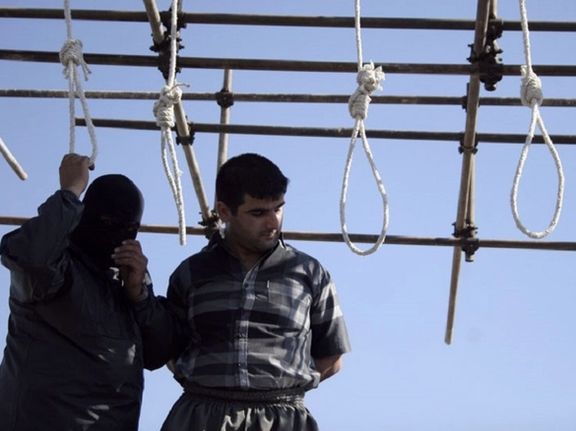
Five men from Marand, in north-western Iran, were executed on Wednesday morning after being convicted of rape.
The defendants were arrested and imprisoned in early June, following their alleged involvement in the gang rape of a woman.
The ISNA news agency reported that Yuosef Ziamehr, Marand's general and revolutionary prosecutor, revealed the details of the case.
“On May 21, 2022, a woman approached the Marand city prosecutor's office and claimed to have been kidnapped by five unknown individuals and forcibly taken to the mountains around the city, where she was subjected to rape by all five perpetrators.”
The law enforcement agents identified and arrested the five defendants within four days of the crime and their subsequent trial culminated in a death sentence, which was upheld by the Supreme Court. The identities of the executed men remain undisclosed.
The timing of these executions coincides with a report from the United Nations High Commissioner for Human Rights, which sheds light on the alarming trajectory of capital punishment in Iran. The report highlights a steep rise in executions, with 582 individuals put to death in 2022, marking an increase of 75% compared to the previous year's figure of 333. Of particular concern is the fact that the 2022 executions included three juveniles.
In 2023, numbers appear to correlate with 2022 with 94 executions recorded in January and February alone.
The report also brings attention to the execution of individuals accused of participating in nationwide protests including those of Mohsen Shekari, Mohammad Mahdi Karami, Mohammad Hosseini, and Majidreza Rahnavard.
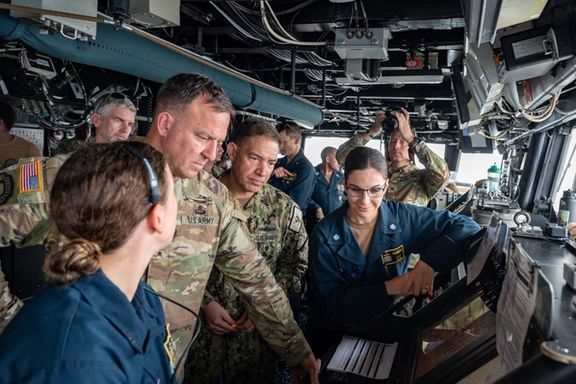
As a display of power in the region, US Gen. Michael “Erik” Kurilla commander of CENTCOM sailed through the Strait of Hormuz aboard a Navy warship, August 6-8.
The US Central Command announced on Tuesday that Gen. Kurilla also paid a visit to the United Arab Emirates and Bahrain, two US allies in the Persian Gulf, whose commercial maritime traffic face a constant threat harassment from Iran.
Iran attempted to seize two commercial vessels in early July in the Persian Gulf but was met with a US response and withdrew, according to the Pentagon. Tehran has harassed or seized more than 15 commercial ships in the past two years in the general area of the Persian Gulf.
Anticipating continued Iranian attacks on commercial shipping, the White House had announced in May that the Biden administration would be making moves in the region, but at the time did not say what they would include.
Later, the Pentagon began to augment the US military presence in the region by deploying F-16 and F-35 warplanes in July, and also dispatching three additional naval vessels carrying more than 3,000 sailors, including Marines.
Following Iran's March agreement to a détente with Saudi Arabia facilitated by China, numerous observers have asserted that the United States is experiencing a loss of influence in the Middle East, signaling a potential end to the era of American dominance in the region.

In a perplexing announcement on May 31st, the UAE announced its withdrawal from a US-led maritime security coalition, a move that took place earlier in the year. The UAE further indicated its ongoing evaluation of its security partnerships.
"As a result of our ongoing evaluation of effective security cooperation with all partners, two months ago, the UAE withdrew its participation in the Combined Maritime Forces," the Ministry of Foreign Affairs said in a statement carried by state news agency WAM.
Iran's navy commander said June 3 that his country and Saudi Arabia, as well as three other Persian Gulf states, plan to form a naval alliance, including India and Pakistan.
"The countries of the region have today realized that only cooperation with each other brings security to the area," Iranian army's navy commander Shahram Irani was quoted as saying.
However, this was not confirmed by any of the other countries allegedly involved and seemed to be an Iranian attempt to gain political leverage after the UAE announcement.
The following day, US 5th Fleet and Combined Maritime Forces spokesperson Cmdr. Tim Hawkins told Breaking Defense, a digital news outlet on global military, “It defies reason that Iran, the number one cause of regional instability, claims it wants to form a naval security alliance to protect the very waters it threatens.”
The UAE announcement, however, remained a mystery, without any follow-up confirmation of its withdrawal from the US-led coalition, or a clear denial by the United States. It is possible that Abu Dhabi was exerting pressure on Washington to show more determination in deterring Iranian maritime adventures.
In this context, General Kurilla's recent sea voyage through the Strait of Hormuz, his diplomatic visits to two allied nations, and the bolstering of US naval and aerial capabilities in the region collectively aimed to provide reassurance to Arab allies.
Kurilla visited UAE where he met with Armed Forces Chief of Staff Lieutenant General Issa Saif Mohammed al-Mazrouei. He then traveled to Bahrain where he met with King Hamad bin Isa Al Khalifa, Lieutenant General Abdullah bin Hassan Al Nuaimi, the Bahrain Minister of Defense Affairs, and the US Fifth Fleet Headquarters.
“These trips to the region provide me deep insights into the relationships with our partners and the readiness of the US and Coalition forces deployed there” said Gen. Kurilla. “I continue to be impressed with the high level of readiness, professionalism, and capability of the US forces serving in CENTCOM. The commitment of our forces and partners is key to regional security.”
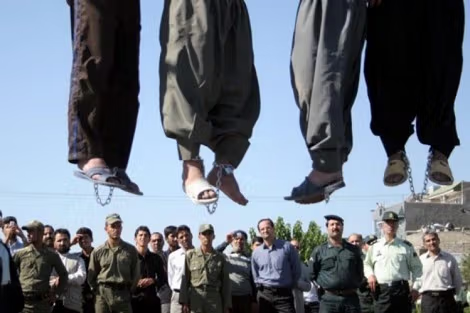
A report submitted to the UN High Commissioner for Human Rights and the Secretary General has called for Iran to halt surging executions and rollback mandatory veiling.
It was among a long list of recommendations in a report submitted last month pursuant to General Assembly resolution 77/228, in which the UN General Assembly requested the Secretary-General to submit an interim report on the situation of human rights in Iran to the Human Rights Council at its fifty-third session.
The report calls for the regime to “immediately halt the execution of all individuals, including those sentenced to death in the context of protests and for drug-related offences, and to refrain from further application of the death penalty”.
This year alone, more than 350 Iranians have been hanged, according to Norway-based Iran Human Rights. The rights group noted it is a 36% increase on the same period last year, likely exacerbated by the ongoing uprising since the death in morality police custody of Mahsa Amini and the subsequent unrest sweeping the country.
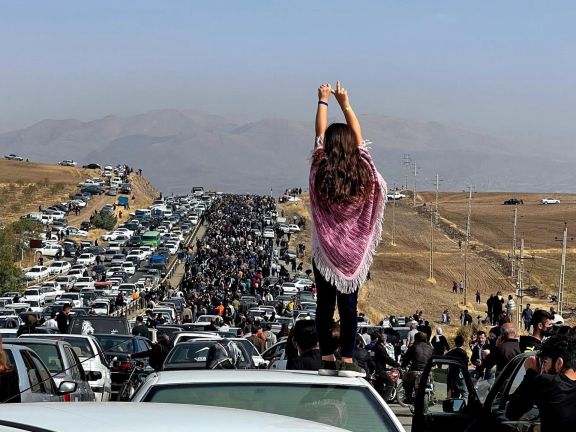
As the trend sees no sign of halting, the UN calls on the regime to “abolish the death penalty and introduce an immediate moratorium on its use and prohibit the execution of child offenders in all circumstances and commute their sentences”.
Referring to the innumerable cases of prisoners detained arbitrarily, including women and girls, human rights defenders, lawyers, and journalists, for legitimately exercising their rights to freedoms of opinion and expression, association and of peaceful assembly, the UN calls on their release. In the 2023 Freedom House report, Iran ranked 12 out of 100 countries for its being “not free”, moving up from 14 in 2022.
Additionally, the UN urged the regime to “guarantee the right of peaceful assembly” and called on the regime to “uphold the full respect for due process and fair trial rights in line with international standards”, including access to legal counsel. Iran refuted the allegations made in the report of a disproportionate response by security forces to the protests.
As internet shutdowns and censorship continue to blight millions across the country, including decimating small businesses which rely on e-commerce, the UN asked that “internet shutdowns are never applied as they inherently impose unacceptable consequences for human rights”.
Addressing the mandatory hijab laws which have most recently seen the return of the morality police to the streets, high level surveillance of the population, brutality and the banning of women from many public places, the UN called on Iran to “take further steps to eliminate all forms of gender-based discrimination and violence against women and girls in law and in practice, including thorough revision and repeal of laws and policies which criminalize non-compliance with compulsory veiling”.
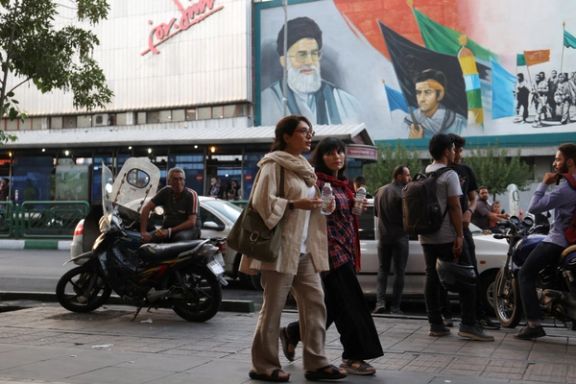
While the hundreds of mystery school poisonings which began last November in Qom and spread nationwide have still got no clearer answers as to the culprits, the UN reiterated the need for an “independent, impartial, prompt, thorough and effective investigation into reported poison attacks on girls’ schools with a view to hold the perpetrators to account; provide full reparations to the victims and guarantee the right to education without discrimination”.
Last month, Viviana Krsticevic, a member of the Fact-Finding Mission on Iran, speaking at a press conference in Geneva said the team, established by the Human Rights Council in November 2022, said: “We have identified major risks of further erosion of women's and girls’ rights in Iran. We have expressed concern about the continuous repression of women and girls opposing forced veiling and their reported use of facial recognition technologies to identify and arrest them.”
The team is also investigating whether alleged poisonings of girls in schools have been orchestrated as a way to punish or deter girls for their involvement in the protests. “Just two months after the protests occurred, a series of alleged poisonings started in dozens of schools in 28 provinces”, added Krsticevic. “Reports said this may have been orchestrated to punish girls or to turn them from involvement in the protests and are being duly investigated in the framework of our mandate.”
Echoing concerns about the proposed use of flogging for those defying compulsory veiling rules, Sara Hossein, Chair of the Fact-Finding Mission, said some of the penalties were “clearly what would constitute inhuman punishment under international law”.
Alongside gender discrimination, the UN also addressed the regime’s continued campaign of repression against minority groups, including the Baha’i community and Iran’s Kurdish population.
The report points out that the regime has still not agreed to join several UN conventions including the Convention on the Elimination of All Forms of Discrimination against Women and the Convention against Torture and Other Cruel, Inhuman or Degrading Treatment or Punishment, emphasizing the need for Iran to conform to international practice.
The Fact-Finding Mission is preparing a comprehensive report on its findings to the Human Rights Council for its 55th session in March 2024.
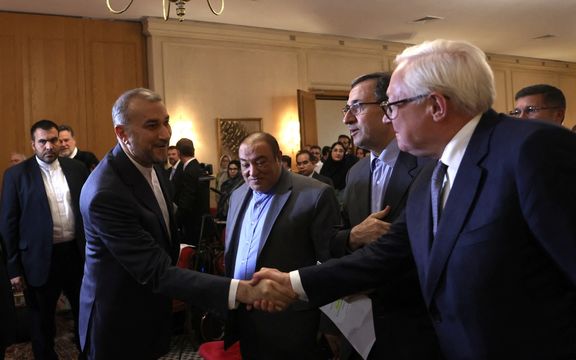
Russia on Tuesday aligned itself with its ally Iran in rejecting Western attempts to maintain sanctions on Iran despite the collapse of the 2015 JCPOA nuclear deal.
After a meeting between respective deputy foreign ministers in Tehran, Russia's foreign ministry said Moscow and Tehran were unanimous in believing that the failure to implement the deal stemmed from the "erroneous policy of 'maximum pressure' pursued by the United States and those who think similarly".
Russia is one of the participants in the Joint Comprehensive Plan of Action (JCPOA), the accord signed between world powers and Iran to restrict Tehran’s controversial nuclear program, especially limiting its uranium enrichment.
Then-US president Donald Trump quit the deal in 2018, imposing economic sanctions, and Iran's relations with the West have been deteriorating ever since, as it has accelerated its nuclear program. Tehran has been enriching uranium to 60-percent purity since 2021 and has accumulated enough fissile material for at least two nuclear weapons.
But Russia, which signed the deal alongside the US, China, Britain, France, Germany and the European Union, has been deepening ties with Iran since its invasion of Ukraine. Iran has supplied hundreds of kamikaze Shahed drones to Russia that have been widely used to attack civilian and infrastructure targets in Ukraine.
The war, which Russia calls a "special military operation", has driven its own relations with the West to their lowest level in decades, bringing on Western sanctions that has isolated Russia economically and politically. Iran is in a similar if not worse situation.
Reports in June indicated that European diplomats had informed Iran they planned to join the US in retaining sanctions on Iran's ballistic missile program that are set to expire in October under the nuclear deal.
They gave three reasons: Russia's use of Iranian drones against Ukraine; the possibility that Iran might transfer ballistic missiles to Russia; and depriving Iran of the benefits of the nuclear deal, which it violated after the US withdrew.
Russian Deputy Foreign Minister Sergei Ryabkov met Iranian counterparts Ali Bagheri-Kani and Reza Najafi.
Russia's foreign ministry said the meeting had emphasized "the unacceptability of any attempts on the part of the West to impose some new schemes and approaches to solving problems related to the JCPOA, which imply damage to legitimate and mutually beneficial Russian-Iranian cooperation in various fields".
It said there was still "no reasonable alternative" to implementing the JCPOA, as approved by the UN Security Council.
In recent months, many media reports have spoken of secret diplomatic efforts to control the tensions with Iran, including releasing Tehran’s frozen funds from countries such as Iraq and South Korea in return for a pledge by Iran not to further increase its uranium enrichment to weapons grade levels, which is 90-percent purity.
So far, except a US sanctions waiver to Iraq for a partial release of funds, no developments have taken place signaling an agreement. Parallel to discussions about Iran’s nuclear program, the US is also trying to secure the release of several American dual-nationals held hostage in Iran. Apparently, the release of $7 billion held in South Korea is the price for releasing the prisoners. But a new complication has emerged with reports that while talks were taking place, Tehran arrested two more individuals, bringing the total to five hostages.
Observers and media in Iran have accused Russia of using the nuclear issue for its own leverage with the West. Multilateral talks that began in Vienna in April 2021, with the Biden administration’s new policy of reviving the JCPOA, failed immediately after Russia’s attack on Ukraine.

Iran’s new hijab bill is becoming murkier still as the parliament has moved to approve it without an open session in fear of further backlash.
The fate of the hijab bill, which legal experts claim is against the Iranian Constitution and not practical to implement due to the government's limited means, took an obscure turn last week after months of heated debate on how to translate it into society.
During a closed-door session on Sunday, Iranian lawmakers voted – 171 for versus 40 against -- that the bill can be considered under Article 85 of the constitution which greenlights the parliament to discuss the bill only in an internal committee and not on the parliament floor, practically sidelining any opposition. The decision was a straw poll and is not yet final, to be discussed and put to a final vote in the coming days. The result of the final vote is clear because the parliamentary party that holds the majority has backed the move.
Normally, the parliament cannot delegate its legislative authority but in necessary cases, it can assign an internal committee to formulate certain laws. The determination of the committee is then sent to the Guardian Council and if it deems the decisions do not go against the Constitution, they can be piloted in the country for a time span determined by the parliament.

Regime lawmaker Moineddin Saeedi, representing the city of Chabahar in the underprivileged province of Sistan and Baluchestan, said “This bill will be discussed in a joint committee without the public being informed of its details, much like the Siyanat (Protection) plan." Ironically titled Legislation to Protect Cyberspace Users’ Rights, the Siyanat plan is a draft bill by ultra-hardliners approved by an ad hoc parliamentary committee in February that led to stricter restrictions on social messaging platforms and access to the global net.
Expressing worries about the repercussions of disregarding the people’s views on the measure, Saeedi said that implementing the bill this way would only, contrary to the regime's plans, exacerbate popular concerns.
According to lawmaker Ahmad Naderi, a member of the parliament's presidium, “A joint committee consisting of members from three committees, namely the Judicial and Legal Committee, the Cultural Committee, and possibly the Social Committee, will be formed to discuss the details of this bill and its enactment.” He added that “the decision on the bill's passage into law will be made discreetly and without being presented in the open session of the parliament.”
The uprising that was sparked by the death in police custody of Mahsa Amini in September has made it increasingly difficult for the clerical regime to enforce the mandatory Islamic dress code. Since the beginning of the ‘Women, Life, Freedom’ movement, tens of thousands of girls and women have shed their compulsory hijab. To avoid the public backlash over the violent enforcement of hijab laws, the Islamic Republic has recently begun implementing a wide range of measures from public humiliation tactics to using traffic cameras to identify women without hijab.
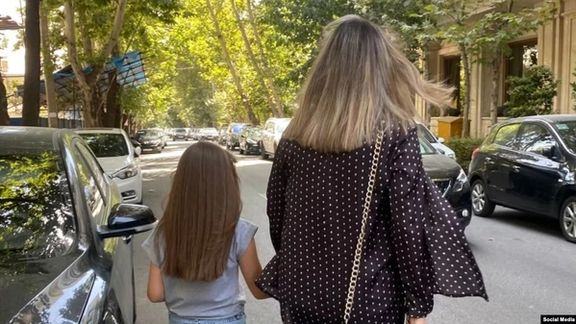
The regime seeks to criminalize hijab defiance but no branch of government wants to be solely responsible for the complications of such an action in society. As debate over how to deal with women who refuse to observe compulsory hijab continues among the authorities, even the hijab or so-called morality police faces a similar reaction by the authorities as they refuse to take responsibility, perhaps due to concern over the upcoming elections.
Political sociologist Mohammad Rahbari says discussing the hijab bill behind closed doors means that “no one will take responsibility for this bill, neither the judiciary, nor the government, and not even the parliament.”
He believes that the fate of such “a law that none of its decision-making entities is willing to take responsibility for” will either not lead to tangible actions or its implementation will be as opaque as the internet protection law. “The common point of both these bills is that many people oppose them, and that’s why members of the parliament do not have the courage to openly discuss them,” he noted.
Lawmaker Hassan Norouzi, a member of the Judicial and Legal Committee, was questioned by a reporter on Tuesday as to whether or not it was better that the people were aware of the details and processes of the hijab bill. He replied, “It has been transparent enough. This law is a matter of governance, and what concerns the people is to abide by it.”
He was asked again if the joint committee will share its final decisions with the public, to which he replied frankly, “No. It's possible that media outlets may say something and the whole plan gets obliterated,” further undermining the credibility of the media in a country deemed one of the world's worst for press freedom.
The "Hijab and Chastity" bill, which was sent to the Islamic Consultative Assembly by the administration of Ebrahim Raisi, initially comprised of only 15 articles. Now in its final days, it has 70 articles with its fate still in limbo.